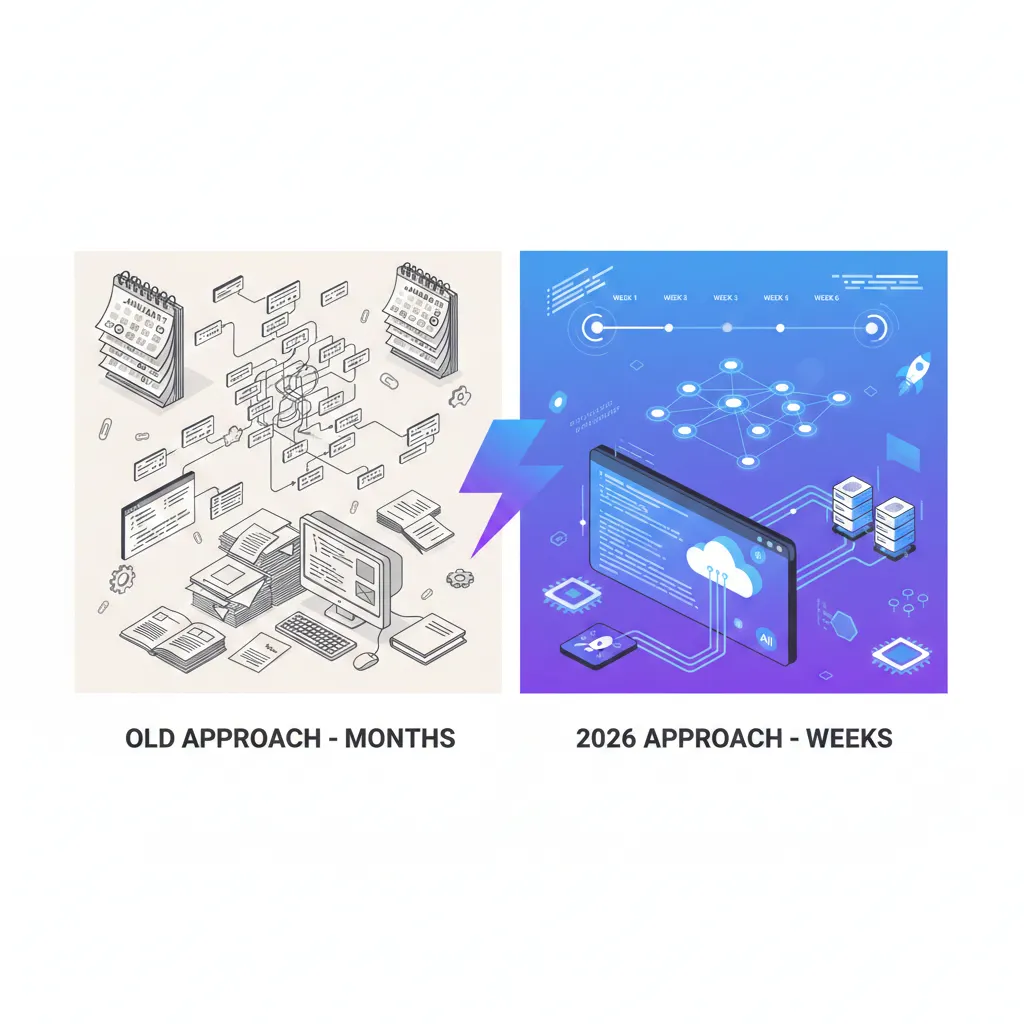Startups are constantly on the lookout for innovative methods to develop their products quickly and efficiently. This is where the concept of an AI driven MVP for startups comes into play. In this blog, we will delve into the significance of AI in building smarter, scalable Minimum Viable Products (MVPs) and how it transforms the rapid prototyping process. We will explore the essential benefits startups gain from leveraging AI, provide real-world case studies, and discuss practical strategies for implementing AI in your MVP development journey.
Understanding the Basics of MVP and AI
What is an MVP?
A Minimum Viable Product (MVP) represents a core version of a product with enough features to satisfy early adopters. It allows startups to test their hypotheses regarding product-market fit without investing significantly in full-scale development. MVPs are essential in the startup ecosystem because they minimize risks associated with product launches by gathering customer feedback and iterating quickly based on that feedback.
Traditionally, creating an MVP involves identifying core functionalities, developing the product, and launching it to a limited audience. However, this process can be fraught with challenges, such as inaccurate market assessments, poor resource allocation, and extensive development timelines, particularly for startups lacking expertise or adequate data.
The Role of AI in MVP Development
Artificial Intelligence (AI) plays a transformative role in modern MVP development. By leveraging machine learning and data analysis techniques, startups can enhance decision-making processes and streamline development cycles. AI-powered tools can automate many tedious tasks that traditionally consume significant time and resources, such as data collection, user analysis, and trend predictions.
With AI integration, MVP creation becomes not just quicker but more aligned with market needs. The insights derived from AI can guide feature prioritization, ensuring startups focus on building products that resonate with users.
Advantages of AI Driven MVP for Startups
Enhanced Decision-Making with Data Driven Insights
One of the most significant advantages of AI in the MVP development process is its capability to analyze vast datasets swiftly and identify patterns. By utilizing AI, startups can generate actionable insights that help refine their product offerings and guide strategic decisions. These insights allow teams to make informed choices about features, pricing, and marketing strategies, which substantially reduce risk and enhance the chances of achieving product-market fit.
Additionally, data-driven decision making leads to high-quality outcomes. When startups rely on concrete data rather than conjectures, they stand a better chance of launching a successful product that meets user needs.
Speeding Up the Prototyping Process
AI technologies significantly expedite the MVP development timeline. Automation tools and AI algorithms can perform tasks that would otherwise take weeks or months in a fraction of the time. For instance, AI-driven design tools can allow startups to prototype interfaces quickly, enabling faster iterations based on real-time feedback.
Tools such as TensorFlow, InVision, and Figma leverage AI to facilitate rapid prototyping, allowing startups to allocate resources better and accelerate their go-to-market strategy.
Key Features of AI-Driven MVPs
Smart Analytics and User Feedback Integration
AI algorithms can substantially improve how startups gather user feedback and iterate their MVP features. Tools that employ natural language processing can analyze user comments and reviews immediately, extracting valuable insights into user preferences and dissatisfaction areas. This fast-paced analysis enables startups to implement necessary changes swiftly.
Furthermore, continuous improvement is central to a successful MVP. Real-time analytics tools can track user interactions and provide constant updates about user behavior patterns, ensuring that businesses remain adaptive to shifts in user preferences.
Predictive Analytics for Market Trends
In addition to optimizing existing features, AI excels at predicting future trends. By analyzing user behavior and market dynamics, startups can harness predictive analytics to forecast user demands and adjust their MVP accordingly. Whether a startup decides to pivot based on emerging trends or enhance existing features, predictive insights are invaluable.
This forward-looking perspective not only keeps startups relevant but also positions them as leaders in the ever-changing marketplace.
Case Studies: Success Stories of AI-Driven MVPs
Startups that Got It Right
Several startups have reaped significant benefits by integrating AI into their MVP strategies. For instance, Udacity utilized an AI-driven MVP to quickly assess user preferences for creating personalized learning paths. The rapid feedback loop enabled them to enhance their offerings considerably and engage a larger audience.
Another example is HubSpot, which employed AI to streamline user onboarding in their MVP phase. As a result, they could target their messaging accurately, leading to improved user retention and engagement.
Lessons Learned from AI-Driven MVP Failures
Not all stories are successful, however. Certain startups have faced hurdles when incorporating AI into their MVP development. For example, a startup may become overly reliant on AI insights and neglect primary market research, leading to a misaligned product launch. Such setbacks highlight the necessity of balanced strategies combining human input with AI analysis.
Learning from these experiences is vital. Startups should prioritize both qualitative and quantitative feedback to inform their decisions best.
Best Practices for Building AI Driven MVPs
Collaborating with AI Experts
Building an AI driven MVP isn’t just about technology; it’s about team collaboration. Startups benefit immensely from involving data scientists and AI specialists early in the MVP process. Their expertise can inform feature development, analytics implementation, and user behavior predictions that enhance the overall product.
Moreover, fostering an innovative environment where collaboration across different specialties, such as design, marketing, and engineering—can lead to better integration of AI capabilities in the MVP development.
Choosing the Right AI Tools and Technologies
When selecting AI tools and technologies, startups need to consider various factors such as scalability, ease of integration, and user-friendliness. There are many platforms available, such as Google Cloud AI, IBM Watson, and AWS AI services, that can help streamline the MVP creation process.
Startups should balance feature sets with ease of use to ensure smooth deployment and adaptation by their development teams.
The Future of AI Driven MVPs in Startups
Emerging Trends and Predictions
The future of AI in MVP development looks promising. Emerging trends indicate a rise in hyper-personalization, where startups will increasingly utilize AI to create tailored user experiences. This hyper-targeting will enable greater engagement and higher conversion rates, forming a key competitive advantage.
Moreover, advancements in AI technology promise to further streamline processes, making it easier for startups to implement sophisticated analytics and predictive features into their MVPs without extensive resources.
How Startups Can Prepare for an AI Driven Future
Startups looking to embrace an AI-driven future should begin incorporating AI into their development cycle early on. By doing so, they can ensure they remain agile and responsive to market trends. Implementing training programs for team members on AI tools will only enhance this readiness.
Staying informed about technological advancements and market changes will also empower startups to innovate continuously, ensuring that they remain at the forefront of their industries.
Conclusion
In conclusion, the transformative power of AI driven MVPs for startups cannot be overstated. By leveraging AI, startups can accelerate their prototyping processes, enhance decision-making, and create products that resonate with market needs. We invite you to share your thoughts, experiences, or questions about AI-driven MVPs in the comments below. Join the conversation and help foster a community dialogue around this evolving topic!
Frequently Asked Questions
An AI driven Minimum Viable Product (MVP) leverages artificial intelligence technologies to enhance the efficiency and effectiveness of product development. It enables startups to quickly create a core version of their product, test it with early adopters, and make data-informed decisions for future iterations.
An MVP allows startups to test their product hypotheses and gather user feedback without significant upfront investment. It helps minimize risks associated with product launches and accelerates the learning process in the market.
AI enhances MVP development by analyzing large datasets, providing actionable insights, automating tedious tasks, and speeding up prototyping processes. This leads to a more streamlined development cycle and helps identify features that resonate with users.
The advantages of AI in MVP development include enhanced decision-making through data-driven insights, faster prototyping, improved user feedback integration, and predictive analytics for market trends that can inform product feature adjustments.
Yes, notable examples include Udacity, which used AI to personalize learning paths based on user preferences, and HubSpot, which streamlined user onboarding, resulting in higher engagement and retention.
Yes, startups can face risks such as over-reliance on AI insights without supplementing them with primary market research. Finding a balance between AI analysis and human input is essential to avoid launch misalignment.
Startups should collaborate with AI experts, choose the right AI tools and technologies suited for their needs, foster interdisciplinary collaboration, and continuously iterate based on user feedback.
Key features of AI-driven MVPs include smart analytics for real-time user feedback integration, predictive analytics for anticipating market trends, and automation tools that support faster development cycles.
Startups can prepare by incorporating AI into their development cycles from the get-go, training team members on AI tools, and staying updated on technological advancements and market trends to remain competitive.
Emerging trends include hyper-personalization, where startups use AI to create tailored user experiences, and advancements in AI technologies that facilitate easier integration of sophisticated analytics and predictive features.




